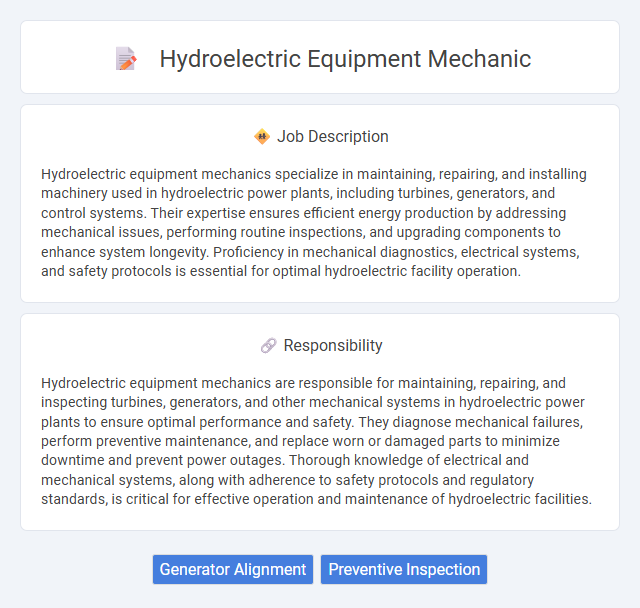
Hydroelectric equipment mechanics specialize in maintaining, repairing, and installing machinery used in hydroelectric power plants, including turbines, generators, and control systems. Their expertise ensures efficient energy production by addressing mechanical issues, performing routine inspections, and upgrading components to enhance system longevity. Proficiency in mechanical diagnostics, electrical systems, and safety protocols is essential for optimal hydroelectric facility operation.
Individuals with strong mechanical skills and a good understanding of hydropower systems will likely find the hydroelectric equipment mechanic job suitable. Those comfortable working in physically demanding environments and able to troubleshoot complex machinery under variable conditions may have better job performance. Candidates with a keen attention to safety protocols and a willingness to work in remote or fluctuating weather conditions might be more successful in this role.
Qualification
Hydroelectric equipment mechanics require specialized technical training in electrical and mechanical systems, often obtained through vocational programs or apprenticeships. Proficiency in troubleshooting, maintenance, and repair of turbines, generators, and control systems is essential for ensuring efficient hydroelectric plant operations. Industry certifications such as those from the National Institute for Certification in Engineering Technologies (NICET) enhance employment prospects and validate expertise in this field.
Responsibility
Hydroelectric equipment mechanics are responsible for maintaining, repairing, and inspecting turbines, generators, and other mechanical systems in hydroelectric power plants to ensure optimal performance and safety. They diagnose mechanical failures, perform preventive maintenance, and replace worn or damaged parts to minimize downtime and prevent power outages. Thorough knowledge of electrical and mechanical systems, along with adherence to safety protocols and regulatory standards, is critical for effective operation and maintenance of hydroelectric facilities.
Benefit
Hydroelectric equipment mechanic jobs likely offer competitive salaries and comprehensive benefits packages that include health insurance, retirement plans, and paid time off. Employees may have opportunities for overtime pay and job stability due to the essential nature of maintaining hydroelectric power systems. Workplace safety programs and ongoing training could also enhance job security and career growth prospects.
Challenge
Hydroelectric equipment mechanics likely face complex challenges involving the diagnosis and repair of high-voltage machinery and turbines that require precision and safety awareness. They probably encounter unpredictable working conditions, including confined spaces and varying weather, which demand adaptability and problem-solving skills. The role may also involve balancing routine maintenance with urgent repairs to minimize downtime and ensure continuous power generation.
Career Advancement
Hydroelectric equipment mechanics maintain and repair turbines, generators, and associated machinery essential for power generation, providing opportunities to develop specialized technical skills in electrical and mechanical systems. Career advancement often involves gaining certifications in industrial maintenance or electrical technology, leading to roles such as lead mechanic, maintenance supervisor, or plant technician. Experience in troubleshooting complex equipment and knowledge of safety regulations further enhance prospects for promotion within hydroelectric power facilities.
Key Terms
Generator Alignment
Generator alignment in hydroelectric equipment mechanic roles ensures precise positioning of rotors and stators to optimize electrical output and minimize mechanical wear. Proper alignment reduces vibration, prevents damage to components, and extends the lifespan of generators, critical for maintaining plant efficiency. Skilled mechanics use laser alignment tools and specialized gauges to achieve exact tolerances required for safe and reliable hydroelectric power generation.
Preventive Inspection
Hydroelectric equipment mechanics perform preventive inspections to identify wear, corrosion, and alignment issues in turbines, generators, and hydraulic systems, ensuring optimal performance and reducing downtime. These inspections involve checking mechanical components such as bearings, seals, and control systems for early signs of failure using diagnostic tools and detailed maintenance records. Regular preventive inspections extend equipment lifespan and enhance the efficiency of hydroelectric power generation facilities.
 kuljobs.com
kuljobs.com